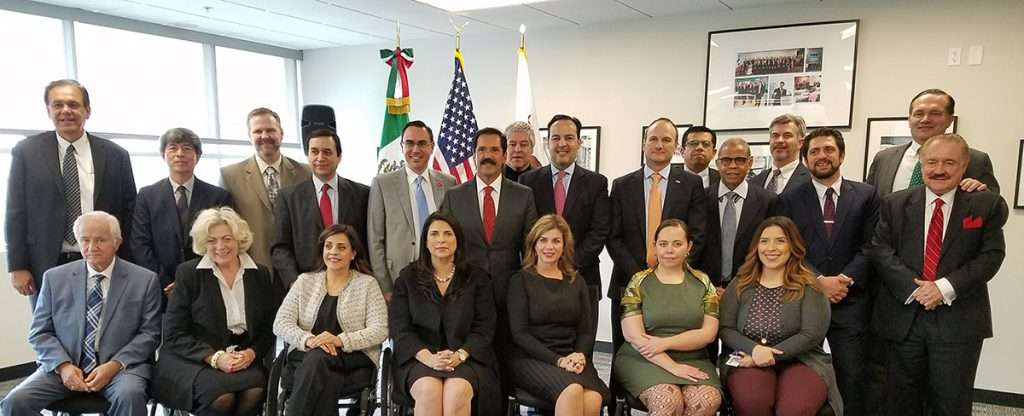
The California Chamber of Commerce recently participated in meetings with a small visiting delegation of senators from Mexico, all members of the Foreign Affairs Committee – North America.
The delegation was accompanied by several private sector representatives. The delegation was led by Mexican Senator and Chair of the North American – Foreign Affairs Committee, Marcela Guerra Castillo. Private sector representatives were from the Economic Development Council of Mexicali and CaliBaja.
CalChamber Vice President Susanne Stirling attended a Roundtable discussion held at the Consulate General of Mexico in Sacramento on Wednesday, February 15. CalChamber Board member Frank Washington of Crossings Television was in attendance, and Board company Kronick Moskovitz was also represented. The delegation was later hosted by the California International Relations Foundation, of which the CalChamber is a member.
The meeting included a presentation by Jose Blanco, Principal of the Central Valley Fund, outlining U.S.-Hispanic Trends and the economic integration between California and Mexico.
Pro Mexico, represented by Oscar Franck Terrazas, also provided background information about the history of California and Mexico, together with recent information focused on trade and investment statistics.
Trade Relationship
In the last 20 years, two-way trade in goods between Mexico and the United States increased dramatically from $81.4 billion in 1993 to $531.1 billion in 2015. Mexico has remained the United States’ second largest export market since 1995, with a total value of $236.4 billion in 2015. Top export categories from the U.S. to Mexico included computer and electronic products, transportation equipment, chemicals, and non-electrical machinery.

Mexico continues to be California’s No. 1 export market, purchasing 16.2% of all California exports. California exports to Mexico amounted to $26.8 billion in 2015, a 5.5% increase from 2014. Computers and electronic products remained California’s largest exports, accounting for 25.1% of all California exports to Mexico. Exports of transportation equipment and machinery from California to Mexico grew to total almost $5 billion; with chemicals and electrical equipment continuing to be strong export sectors as well.
Also in 2015, California imported $45 billion in goods from Mexico, a 9.2% increase from 2014. The top import categories were transportation equipment, computer and electronic products, agricultural products, and manufactured commodities. California is the second largest importing state for good from Mexico.
According to a September 2014 report by Visit California, nearly 7.5 million people visited California from Mexico in 2013, spending nearly $3 billion. Mexico sends more visitors to California than any other country by a wide margin.
NAFTA
The discussion centered on the current relationship between the United States and Mexico, and California’s particular interest in relations with Mexico. All agreed on the importance of maintaining and nurturing a positive relationship between California and Mexico. In particular, continuing the trading and investment relationship was emphasized. There was discussion of future opportunities, specifically in the clean tech area. The possibility of opening the North American Free Trade Agreement (NAFTA) also was discussed. The Mexican government is beginning an inclusive consultation process in which all sectors will be heard about the possible modernization of NAFTA. The Mexican Senate will be participating in these consultations and taking note of all the considerations presented as the body responsible for the analysis, leading a responsible discussion, and eventually assessing and deciding whether to ratify a modernized NAFTA.
By way of background, on December 17, 1992, the NAFTA was signed by President George H.W. Bush, Mexico President Carlos Salinas, and Canadian Prime Minister Brian Mulroney. The framework agreement proposed to eliminate restrictions on the flow of goods, services, and investment in North America. The historic agreement, after passing through both the U.S. House of Representatives and the U.S. Senate, was signed into law by President Bill Clinton on December 8, 1993, and took effect on January 1, 1994.
Trilateral trade within North America is one of the largest economic relationships in the world with more than $1 trillion in goods traded annually. In California alone, more than 1.6 million jobs depend on trade with Canada and Mexico, and more than $100 billion in goods and services are traded between the two countries and California each year.
The CalChamber actively supported the creation of NAFTA among the United States, Canada and Mexico. CalChamber support for NAFTA is based on an assessment that it serves the employment, trading and environmental interests of California, the United States, Canada and Mexico, and is beneficial to the business community and society as a whole.


